One of the big draws of Midwest Uke Camp is the opportunity to learn from some of the best instructors available! The organizers spend a lot of time lining up top talent and then trying to fit it all into a coherent schedule. And Ben Hassenger and company do a great job. Everyone has to choose eight workshops from a selection of over 60!
When selecting workshops, I consider a number of factors. I usually start with the track aimed at my playing level, looking down the list of classes. Typically, I will eliminate any class I’ve already taken, but you’ll see below where I actually repeated myself! The other big consideration is to try and take a course from as many different instructors as I can. Not only does it expose me to new instruction, but helps me learn effective teaching techniques to use in both my ukulele workshops and for my job. The last big item I look at will be whether the instructor is local, knowing that I have a better chance of a local instructor holding a workshop nearby or being invited back.
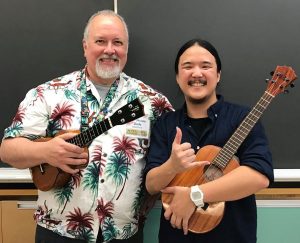 My first workshop was with Neal Chin, who was at MUC for the first time. I took his “Accompanying and Dynamics” workshop where he taught us about the important role of painting the set for the melody to reside. We talk about ways to elevate a song and some useful tips on becoming a better accompanist along with ways to expand harmony, the sonic picture, and learn about playing in groups. He took us through a sequence of chords and then some basic tabs. Then we worked together to develop rhythm and the dynamics with each other. We divided into small groups and I got to work in a small group with Shari and Mike, two of my favorite ukulele event regulars.
My first workshop was with Neal Chin, who was at MUC for the first time. I took his “Accompanying and Dynamics” workshop where he taught us about the important role of painting the set for the melody to reside. We talk about ways to elevate a song and some useful tips on becoming a better accompanist along with ways to expand harmony, the sonic picture, and learn about playing in groups. He took us through a sequence of chords and then some basic tabs. Then we worked together to develop rhythm and the dynamics with each other. We divided into small groups and I got to work in a small group with Shari and Mike, two of my favorite ukulele event regulars.
A native of Maui Neal has been an ‘ukulele educator and performer over the course of his musical career of 17 years. His contribution to the The Akira Project, won his first Nā Hōkū Hanohano Award in 2014 before moving to the Pacific Northwest. He was nominated for the 2017 Nā Hōkū Hanohano Award for ‘Ukulele Album of the Year for ‘Ukulele Paintings and released his sophomore ‘ukulele album The Spotless Mind. Neal lives, teaches, and performs in Seattle, WA.
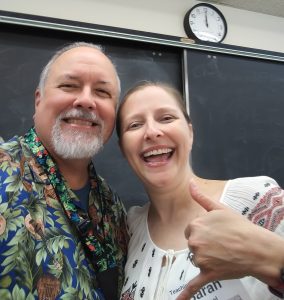 Sarah Maisel was the only instructor that I took two courses from this year. I took her “Jazz Blues” class as it had been two years since I taken it and the other two courses of interest during this time frame I had taken more recently than that. The big plus to the class was that Sarah typically uses a different song when she works through her magical chord changes and this one was based on the 12-bar blues. Always a fun class and it helps expand out repertoire!
Sarah Maisel was the only instructor that I took two courses from this year. I took her “Jazz Blues” class as it had been two years since I taken it and the other two courses of interest during this time frame I had taken more recently than that. The big plus to the class was that Sarah typically uses a different song when she works through her magical chord changes and this one was based on the 12-bar blues. Always a fun class and it helps expand out repertoire!
On Saturday I took her class on “Who Needs a Chord Book?” While many of the concepts are the basic chord theory lines, Sarah has a way of making it fun and her knowledge throws in numerous facts that might be a total no-brainer for a music major, but are a total mystery to an engineer! (Why is it called a 7th chord? Because you add the 7th note to the chord! Duh!)
In September 2006, Sarah and a friend went to check out an ukulele group at a pizza parlor in Encinitas, CA. As Sarah put it “It was so amazing to go to this place where there were at least 40 ‘ukuleles, everyone was so happy, the room was filled with such joy. I just had to be a part of it.” As serendipity would have it, Frank Leong, the group leader, was starting group ‘ukulele lessons that October 2006. Sarah signed up and has been hooked on the uke ever since.
Sarah has a number of albums including ‘Have Uke Will Travel,’ ‘In the Moment’, and ‘With Love- Sarah Maisel’. She travelled globally and participated in many festivals, as well as meeting and collaborating with Craig Chee. This collaboration created more travel for 2014, where they both traveled around the world touring and recording an International Limited Release album called “Say When”. Now married, Sarah and Craig have been touring in support of their 2015 recording, “Scene 1, Take 1”.
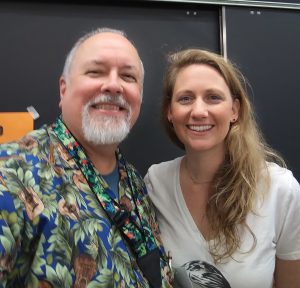 Victoria Vox treated us to an “Intro to Line Cliches”. A line clichés is a descending or ascending line that moves against a single stationary chord. Some of the well known line cliché tunes include the James Bond theme song, “Michelle” (McCartney / Lennon), “Blue Skies” (Irving Berlin), “One” (Harry Nilsson), and Victoria’s own “Mon Coeur Vide”. We can alter the harmony of a song to incorporate the clichés into the in both major and minor keys. It’s a great way to embellish a chord progression or spice up a stagnant melody line. We’ll also looked at a little music theory but it wasn’t too scary!
Victoria Vox treated us to an “Intro to Line Cliches”. A line clichés is a descending or ascending line that moves against a single stationary chord. Some of the well known line cliché tunes include the James Bond theme song, “Michelle” (McCartney / Lennon), “Blue Skies” (Irving Berlin), “One” (Harry Nilsson), and Victoria’s own “Mon Coeur Vide”. We can alter the harmony of a song to incorporate the clichés into the in both major and minor keys. It’s a great way to embellish a chord progression or spice up a stagnant melody line. We’ll also looked at a little music theory but it wasn’t too scary!
An award-winning songwriter and performer originally from Green Bay, WI, she has lived in France, England, Nashville, Baltimore, and now resides in Costa Mesa, CA. She studied at the Berklee College of Music and in 2003, she took up the ukulele as her main accompaniment. Since the release of her first ukulele album in 2006 (… and her Jumping Flea), Vox has been one of the leading songwriters on the ukulele scene. She performs mostly as a one-woman-band, incorporating a loop pedal and bass effect on her ukulele, while taking her own solos on her famous mouth-trumpet she cuts through it all with her genuine lyrics and pure voice.
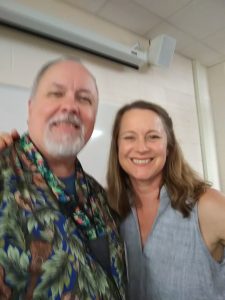 Heidi Swedberg hosted a small group for “From Standard to Baritone and Back”. Based on Cole Porter’s “It’s Too Darn Hot!” she walked us through playing the song on the standard gCEA tuned ukulele. Then we played it on the baritone, using the same chord shapes in the same location on the fret board. Then we learned a baritone version, which we then played on the standard. In addition to the automatic transposition that occurs, we got to play around with a fun song that included making up lyrics on the fly.
Heidi Swedberg hosted a small group for “From Standard to Baritone and Back”. Based on Cole Porter’s “It’s Too Darn Hot!” she walked us through playing the song on the standard gCEA tuned ukulele. Then we played it on the baritone, using the same chord shapes in the same location on the fret board. Then we learned a baritone version, which we then played on the standard. In addition to the automatic transposition that occurs, we got to play around with a fun song that included making up lyrics on the fly.
Heidi Swedberg was born in Hawaii, and got her first ukulele from the Easter Bunny when she was 5 years old. After she studied at the University of New Mexico and working as an acting apprentice and costume intern at Actor’s Theatre of Louisville she launched a 20+ year career in film and television. Singing and playing ukulele with her children brought her so much joy that she moved into the classroom and teaching led to recording. Collaborating with Daniel Ward opened vast musical doorways.
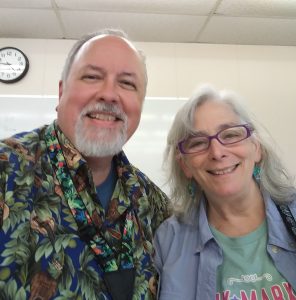 After much struggle, I decided to take Cathy Fink’s “Clawhammer 101” workshop. The method emulates the right hand method of the banjo clawhammer technique. The struggle was that I took this same workshop last year. I had enjoyed the class, and also took the ‘extra’ class session she help after the Saturday concert last year and that was scheduled as “Clawhammer 201” this year. The deciding factor was that I hadn’t had a class from her this year and I liked the technique enough that I wanted to see if my practice over the last year had been on point or if I had been wasting my time. It turned out to be one of the highlights of my weekend, when Cathy watched me for a minute and commented, “You’ve got a pretty good right hand!” and moved on without corrections. I predict that I’ll be able to do an entire clawhammer song for the open mic at MUC 7!
After much struggle, I decided to take Cathy Fink’s “Clawhammer 101” workshop. The method emulates the right hand method of the banjo clawhammer technique. The struggle was that I took this same workshop last year. I had enjoyed the class, and also took the ‘extra’ class session she help after the Saturday concert last year and that was scheduled as “Clawhammer 201” this year. The deciding factor was that I hadn’t had a class from her this year and I liked the technique enough that I wanted to see if my practice over the last year had been on point or if I had been wasting my time. It turned out to be one of the highlights of my weekend, when Cathy watched me for a minute and commented, “You’ve got a pretty good right hand!” and moved on without corrections. I predict that I’ll be able to do an entire clawhammer song for the open mic at MUC 7!
A two time GRAMMY® Awards winner, she plays numerous instruments and has played across the US with some of the top musicians available. She has been playing and recording with Marcy Marxer for almost four decades and together they have released over 45 albums.
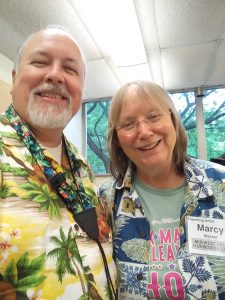 Sunday morning was my biggest attack of FOMO! After a bit of struggle, I opted for Marcy Marxer’s workshop on “Bye Bye Blues.” The deciding factor was that she had learned to play this song from Roy Smeck himself! In addition to working through the song itself, she taught us a versatile intro riff and told stories about learning from Roy, wheeling around in a wheelchair, but still pulling her leg on many occasions.
Sunday morning was my biggest attack of FOMO! After a bit of struggle, I opted for Marcy Marxer’s workshop on “Bye Bye Blues.” The deciding factor was that she had learned to play this song from Roy Smeck himself! In addition to working through the song itself, she taught us a versatile intro riff and told stories about learning from Roy, wheeling around in a wheelchair, but still pulling her leg on many occasions.
 Daniel Ward has been hitting the ukulele world with his meditation materials and I was glad to take his class “Advanced Meditation.” Daniel shared a variety of short songs and warm-ups that a player can “loop” over and over. The main focus is getting a strong and consistent right hand pattern that enables you to cycle through chords in a mesmerizing pattern, relaxing and easing your stress. The finger picking patterns can be readily applied to many different songs as well as the patterns he walked us through that Sunday morning.
Daniel Ward has been hitting the ukulele world with his meditation materials and I was glad to take his class “Advanced Meditation.” Daniel shared a variety of short songs and warm-ups that a player can “loop” over and over. The main focus is getting a strong and consistent right hand pattern that enables you to cycle through chords in a mesmerizing pattern, relaxing and easing your stress. The finger picking patterns can be readily applied to many different songs as well as the patterns he walked us through that Sunday morning.
Daniel Ward teaches ukulele in Los Angeles, California at U-Space and McCabes Guitar Shop as well as at festivals across the United States, including his recent visit to Mighty Uke Day in Lansing earlier this year. His work includes his album “EL UKULELE’, as well as co-authoring “COLOR-ALONG UKULELE”, and “ARPEGGIO MEDITATIONS FOR UKULELE”.
Lil’ Rev was another of my early workshop instructors. He is an awesome entertainer and can easily keep an audience hanging on ever word as he blends music and story telling and instruction all into a natural flow. In addition to a variety of ukulele workshops, he helps with the harmonica classes.
Ben Hassenger is the Official Unofficial Ukulele Ambassador of Michigan. He has been a key advocate of the instrument and responsible for a multitude of ukulele events in the state and elsewhere. He plays with The Ukulele Kings and has some great originals!
Sandy Weltman is works the harmonica track and includes a Baritone class in his teaching duties.
Andy Wilson is another versatile musician whose harmonica and ukulele skills make him a favorite.
Frank Youngman is a seasoned educator who teaches and plays many instruments. He is well known in the Michigan music scene and found at Wheatland and Uketoberfest as well as Midwest Uke Camp.
Jim D’Ville is a first timer at MUC who has been rocking the uke world with his Play by Ear workshops and web site. I am looking forward to getting into a couple of his events this summer!
Melissa Sigh is another first timer at Uke Camp, but we can expect to see more of her! She teaches ukulele at Sigh Studios in Lansing.
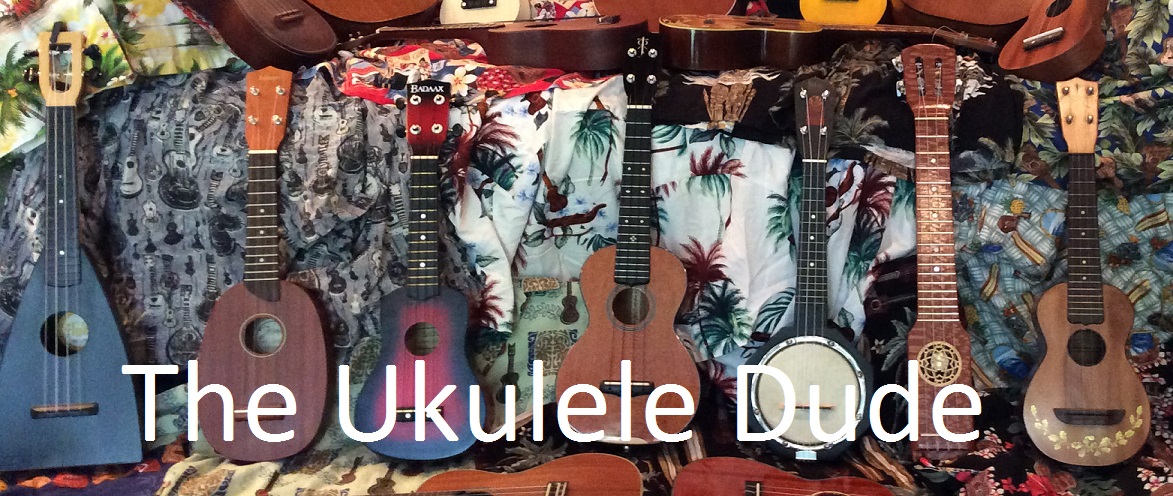
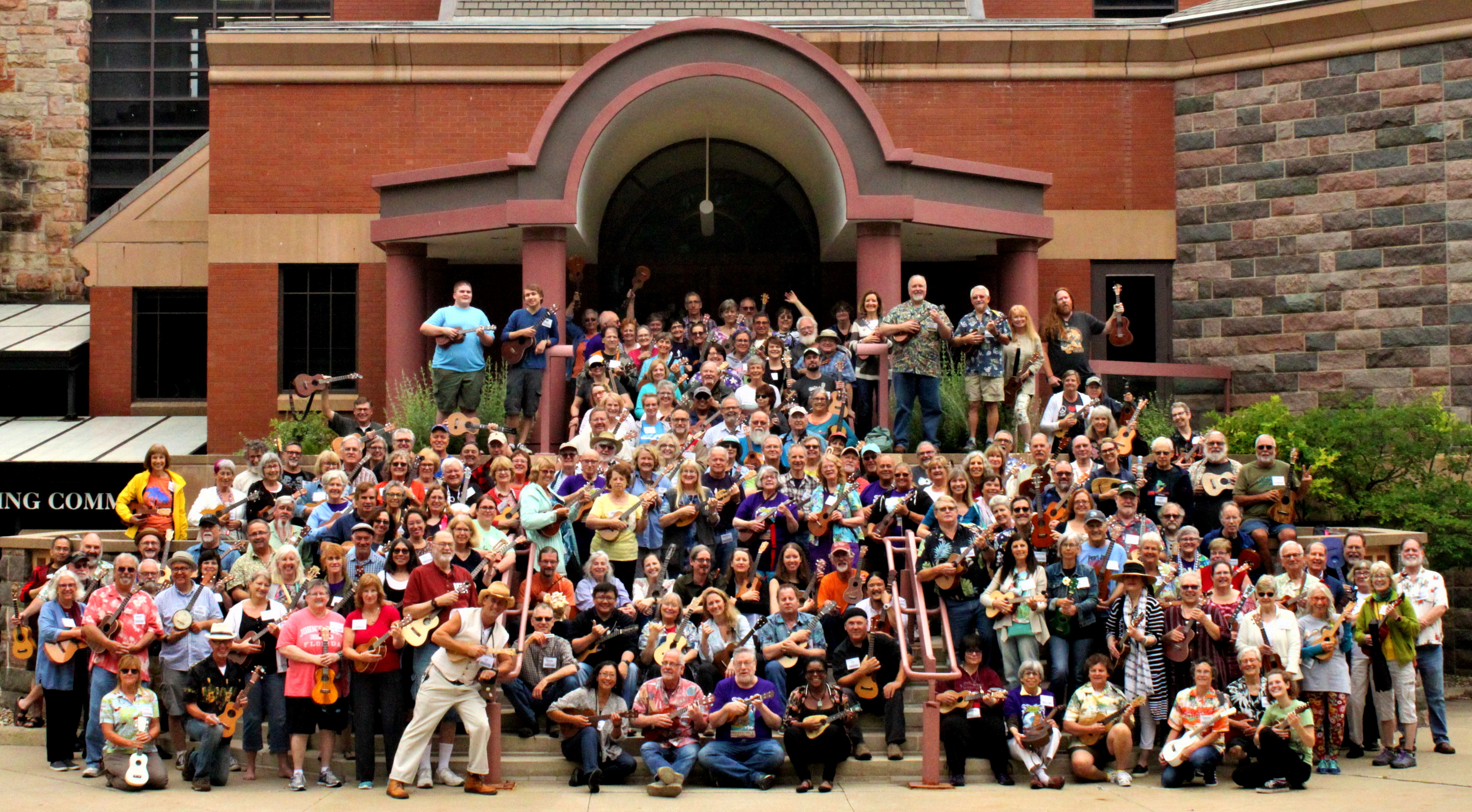
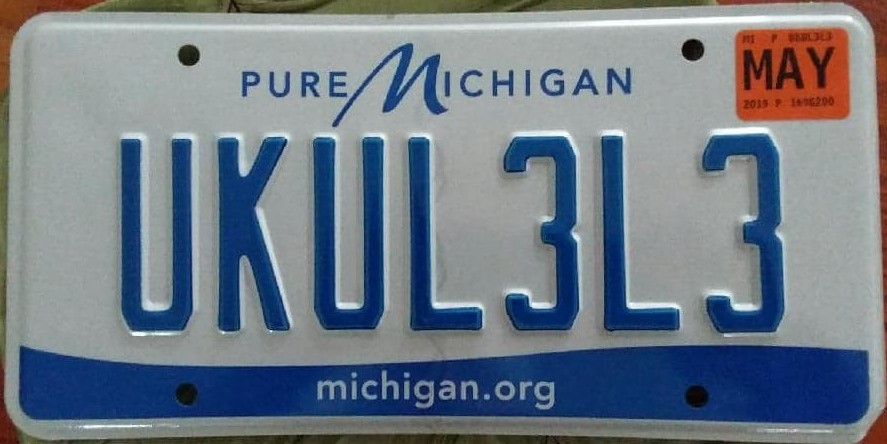
Hello!
My wife’s aunt left us a house full of things, including what looks like a 1920’s CF Martin ukulele. I’m trying to learn more about it and Googled much information. You truly seem to be the expert on this topic. I took many pics based on your instructions but can’t find an email address to send them to you.
Are you still wiling to he offer your educated opinion of the age and type of an instrument?
Any help will be truly appreciated,
Tim